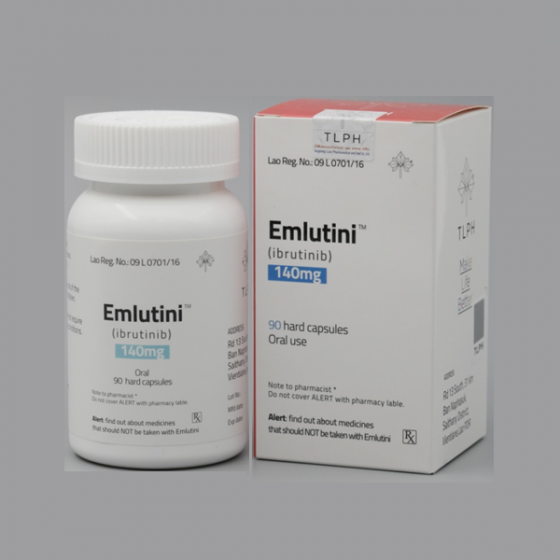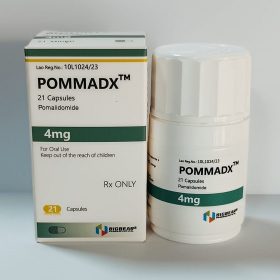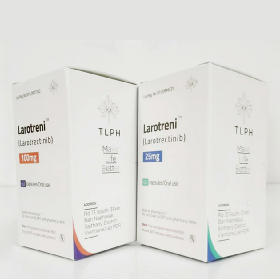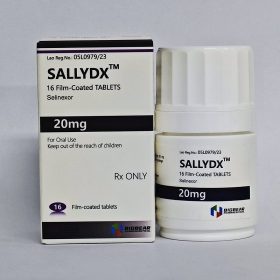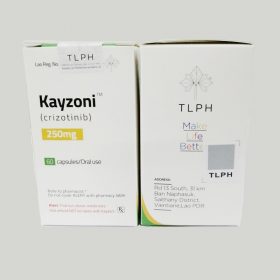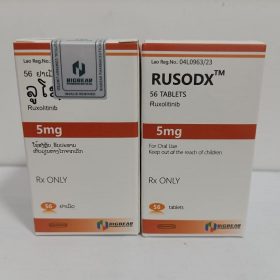- Details
- Description
-
Packaging Size90C/bottle
-
Strength140mg
-
CompositonIbrutinib
-
TreatmentChronic Lymphocytic Leukemia(CLL),Small Lymphocytic Lymphoma(SLL),Mantle Cell Lymphoma(MCL),Waldenström Macroglobulinemia(WM),Marginal Zone Lymphoma(MZL),Graft vs Host Disease(cGVHD)
-
FormCapsule
-
BrandEmlutini
-
Quantity Unit140mg/C*90C/Bottle
-
ManufacturerTongmeng (Lao) Pharmaceutical & Food Co., Ltd.(TLPH)
Ibrutinib, sold under the brand name Emlutini, Imbruvica among others, is a small molecule drug that inhibits B-cell proliferation and survival by irreversibly binding the protein Bruton's tyrosine kinase (BTK). Blocking BTK inhibits the B-cell receptor pathway, which is often aberrantly active in B cell cancers. Ibrutinib is therefore used to treat such cancers, including mantle cell lymphoma, chronic lymphocytic leukemia, and Waldenström's macroglobulinemia.
It is on the World Health Organization's List of Essential Medicines.
Medical uses
Ibrutinib is used to treat chronic lymphocytic leukemia (CLL), Waldenström's macroglobulinemia, and as a second-line treatment for mantle cell lymphoma, marginal zone lymphoma, and chronic graft vs host disease. BTK inhibition by ibrutinib impairs the BCR signalling pathway, which is a key dependency of malignant B cells, but it has been shown that BTK inhibition also interferes with CD40 signalling, B cell adhesion and migration.
In the United States ibrutinib is indicated for the treatment of adults with mantle cell lymphoma (MCL) who have received at least one prior therapy, adults with chronic lymphocytic leukemia (CLL)/small lymphocytic lymphoma (SLL) with or without 17p deletion, adults with Waldenström's macroglobulinemia (WM), adults with marginal zone lymphoma (MZL) who require systemic therapy and have received at least one prior anti-CD20-based therapy, adults with chronic graft versus host disease (cGVHD) after failure of one or more lines of systemic therapy.
It is a first line treatment in those with CLL who require treatment and are newly diagnosed.[11] It may also be used in CLL that relapses.
Why is this medication prescribed?
Ibrutinib is used
to treat people with mantle cell lymphoma (MCL; a fast-growing cancer that begins in the cells of the immune system) who have already been treated with at least one other chemotherapy medication,
to treat people with chronic lymphocytic leukemia (CLL; a type of cancer that begins in the white blood cells) and small lymphocytic lymphoma (SLL; a type of cancer that begins mostly in the lymph nodes),
to treat people with Waldenstrom's macroglobulinemia (WM; a slow-growing cancer that begins in certain white blood cells in your bone marrow),
to treat people with marginal zone lymphoma (MZL; a slow growing cancer that begins in a type of white blood cells that normally fights infection) who have already been treated with a certain type of chemotherapy medication,
and to treat people with chronic graft vs host disease (cGVHD; a complication of hematopoietic stem-cell transplant [HSCT; a procedure that replaces diseased bone marrow with healthy bone marrow] that may start a while after the transplant and last for a long time) after being treated unsuccessfully with 1 or more medications.
Ibrutinib is in a class of medications called kinase inhibitors. It works by blocking the action of the abnormal protein that signals cancer cells to multiply. This helps stop the spread of cancer cells.
How should this medicine be used?
Ibrutinib comes as a capsule and a tablet to take by mouth. It is usually taken once daily. Take ibrutinib at around the same time every day. Follow the directions on your prescription label carefully, and ask your doctor or pharmacist to explain any part you do not understand. Take ibrutinib exactly as directed. Do not take more or less of it or take it more often than prescribed by your doctor.
Swallow the capsules whole with a glass of water; do not open, break, or chew them. Swallow the tablets whole with a glass of water; do not cut, crush or chew them.
If you are receiving obinutuzumab (Gazyva) injection or rituximab (Rituxan) injection, your doctor may tell you to take your dose of imbrutinib before you receive your injection.
Your doctor may decrease your dose, or interrupt or discontinue your treament. This depends on how well the medication works for you and the side effects you experience. Talk to your doctor about how you are feeling during your treatment. Continue to take ibrutinib even if you feel well. Do not stop taking ibrutinib without talking to your doctor.
Ask your pharmacist or doctor for a copy of the manufacturer's information for the patient.
Other uses for this medicine
This medication may be prescribed for other uses; ask your doctor or pharmacist for more information.
What side effects can this medication cause?
Ibrutinib may cause side effects. Tell your doctor if any of these symptoms are severe or do not go away:
diarrhea
nausea
constipation
vomiting
stomach pain
heartburn or indigestion
decreased appetite
excessive tiredness or weakness
muscle, bone, and joint pain
muscle spasms
swelling of the hands, feet, ankles, or lower legs
rash
itching
sores in the mouth and throat
anxiety
difficulty falling asleep or staying asleep
cough, runny or stuffed nose
blurred vision
dry or watery eyes
pink eye.

